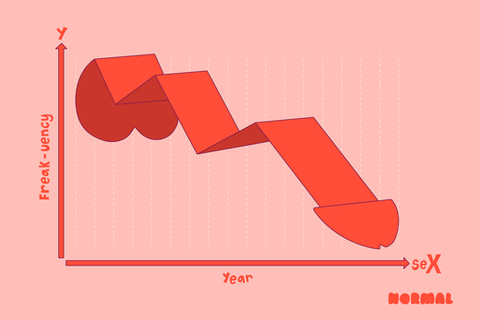If you’ve noticed that your sex life has been feeling a little lacklustre recently, you may not be the only one.
Depending on who you ask, Gen Z and Millennials are currently either in the middle of a ‘sex recession’ or just emerging from one. The blame for this recession has been pinned on a broad ‘culture of mistrust’, influenced by social media; an imbalance between the supply and demand for sexually-charged media; and a combination of the news cycle, sleep deprivation, and the golden age of the vibrator.
Okay, so the term ‘sex recession’ might sound a little dramatic, and we don’t think that vibrator usage is an omen of a dead bedroom (far from it!).
But the facts don’t lie: a 2019 survey by the ABC found that 40% of young adults between the ages of 18 and 24 had ‘never’ had sex. According to the CDC in the United States, the amount of young people who say they have never had sex has been declining steadily since 1991. And one study in the American Journal of Men’s Health found that although rates of sexual activity have remained relatively constant across time, men born between 2000 and 2004 had higher rates of sexual activity than other generations did at the same age (there was no information provided about other genders, unfortunately).
So whether we call it a recession or not, the stats don’t lie. Young people are having less sex, and we have one question: why?
***
First up, we want to be clear that we support everyone in making their own, individual choices about how much sex they want to have (or not have). The quantity and frequency of sex doesn’t determine its quality, and there are many, many people out there who aren’t having sex and still have happy, fulfilling lives and relationships.
But we are curious to know why there are broad, quantifiable declines in sexual activity that span entire generations. Are we becoming less interested in sex? Has something turned us off (literally)? We have a few theories—and we’re interested to hear yours, as well.
Maybe the understanding of ‘sex’ is changing?
In many of the studies we’ve read, ‘sex’ is generally defined as penetrative sex, and often assumed to be between someone with a penis and someone with a vagina. We wonder if some studies are accidentally misrepresenting the sexual activity of young adults by not including other forms of sex, like oral, anal, mutual masturbation and foreplay, and ‘technology-based’ sexual activities like sexting, which many in long-distance relationships might do more frequently. We also note that focusing on rates of penetrative sex can exclude people who don’t have the anatomy, or the want, to participate in this particular act. Sure, declining rates of penetrative sex is interesting from a data science-y point of view, but we wonder if it’s truly representative of how much sexual activity people are really having.
Maybe it’s the cost of living?
This one feels pretty obvious to us, but if you’re a younger person who is struggling under the weight of HECS debt, stagnant wages, and the housing crisis, sex may not be the first thing on your mind. Don’t get us wrong, we know that other generations didn’t always have it easy either, but things feel particularly bad and stressful at the moment, and it makes sense to us that the current state of everything might have people focused more on surviving, and less on thriving. With some younger people picking up second and even third jobs just to get by, it also seems like a lot of us may simply not have time to meet people and pursue relationships, even if we really want to.
Maybe it is to do with social media and our digital lives?
We love social media and the way it helps us learn, connect, and socialise, but perhaps the influence that social media has over our personal lives has made us pull back a little from real-world socialising. Van Badham writes in The Guardian that,
“The digital paradigm has come to contain us,”
and that the sense of mistrust many of us feel when navigating the online world has leaked into our personal life as well. Like, is that website really trustworthy? Is that photo really genuine? Is that cutie we’re chatting to on a dating app actually a bot, or about to scam us, or in a relationship? Badham says,
“The terror is valid. The personal cost is incalculable,”
noting that although we’re right to sometimes be wary, it also comes at a cost.
Maybe it’s all to do with the pandemic.
Let’s not forget that less than five years ago, the majority of the world was plunged into lockdown to avoid a deadly virus—and although treatments have advanced and improved, that virus hasn’t gone away and likely won’t for a long time. If you went into the pandemic single, you’ll know that it was difficult to meet new people during that time, and hooking up was off the cards for a good couple of years due to social distancing and lockdowns. Maybe it’s not the cost of living or the influence of the internet at all—maybe this ‘recession’ is just the result of a pandemic.
Maybe…the recession is over?
A recent study by eHarmony found that over a third of Gen Z and Millennials are having more sex now than they were a year ago, and roughly the same amount of people who are in relationships are also having more sex now than they were last year. Recession over? Maybe! Or maybe human relationships are messy and intangible, and the amount of sex we’re having doesn’t really matter as much as the quality of the time we spend with the people we love.
Now we’re keen to hear your thoughts. Do you think we’re in a ‘sex recession’? Why or why not? And if so—what’s the cause? Reach out to us on our socials and let us hear your thoughts!







